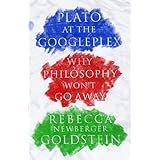The founder of "Socrates Cafe" (and author of several Socratically-inspired books including the eponymous original title)
has a passion for inquiry -- and of a sort that transforms the way we relate to one another, to ourselves, and our world. A foremost specialist in the Socratic Method, he reminds us that we ought to ask questions – “not about any chance question,” as Socrates put it in Plato’s Republic, “but about the way one should live.” He encourages us to roll up our mental sleeves, turn on our childlike questioning lenses, and become our own best thinkers, askers, doers...Christopher Phillips - Home

"Socrates in Love: Philosophy for a Passionate Heart"
(W. W. Norton & Company 2007)
Taking as his springboard for modern Socratic inquiry the five traditional forms of love as practiced by the Greeks of antiquity--eros (erotic love), storge (family love), philia(friendship love), xenia (stranger love), and agape (unconditional love)--Phillips sets out to explore, in a wide variety of venues around the world, with people of all walks of life, how we can become a more loving world today, and how we can and even must learn about the wise, loving ways of the Greeks of old--particularly those of Socrates, who embodied all aspects of Greek love at a time when his own beloved society was in deep decline, seeking to resuscitate those loving practices that might once again set his society on an evolving course.

"Six Questions of Socrates: A Modern-Day Journey of Discovery Through World Philosophy"
(W. W. Norton & Company 2004)
In his successful follow up, Christopher Phillips poses “original” questions of Socrates--as recorded by Plato--in the most diverse cultural circumstances. This unconventional method of discussion brings out surprising commonalities--he begins with "What is virtue?" in the remains of an ancient marketplace in Athens and moves on to a Navajo reservation in the Southwest, where it turns out that the Navajo conception of virtue, hozho, includes a sense of order and harmony with the natural world both similar to and distinct from the conception of the ancient Greeks. In Detroit, Phillips discusses "What is moderation?" with a group of twenty Muslim women, some veiled, some not, who explain to him the Koranic notion of a "just mean" or "balance between extremes."
Phillips continues this work, venturing to foreign lands and engaging in spirited and provocative discussions with people from many backgrounds: Japanese fifth-graders, Somalian refugees, a Mexican museum worker, an Israeli university student, Korean Buddhists... The responses uncover surprising commonalities between cultures and reveal the deep connections between classical philosophy, modern life and the rich traditions and experiences of people far removed from the “canon” of Western academic philosophy.
(W. W. Norton & Company 2004)
In his successful follow up, Christopher Phillips poses “original” questions of Socrates--as recorded by Plato--in the most diverse cultural circumstances. This unconventional method of discussion brings out surprising commonalities--he begins with "What is virtue?" in the remains of an ancient marketplace in Athens and moves on to a Navajo reservation in the Southwest, where it turns out that the Navajo conception of virtue, hozho, includes a sense of order and harmony with the natural world both similar to and distinct from the conception of the ancient Greeks. In Detroit, Phillips discusses "What is moderation?" with a group of twenty Muslim women, some veiled, some not, who explain to him the Koranic notion of a "just mean" or "balance between extremes."
Phillips continues this work, venturing to foreign lands and engaging in spirited and provocative discussions with people from many backgrounds: Japanese fifth-graders, Somalian refugees, a Mexican museum worker, an Israeli university student, Korean Buddhists... The responses uncover surprising commonalities between cultures and reveal the deep connections between classical philosophy, modern life and the rich traditions and experiences of people far removed from the “canon” of Western academic philosophy.

"Socrates Café: A Fresh Taste of Philosophy"
(W. W. Norton & Company 2001)
In his bestseller Socrates Café, Phillips describes his extensive travels across the U.S. starting philosophical discussion groups and recalls what led him to start his itinerant program to begin with. Recounting some of the most invigorating sessions, he reveals sometimes surprising, often profound reflections on the meaning of love, friendship, work, growing old, and others among Life's Big Questions.
(W. W. Norton & Company 2001)
In his bestseller Socrates Café, Phillips describes his extensive travels across the U.S. starting philosophical discussion groups and recalls what led him to start his itinerant program to begin with. Recounting some of the most invigorating sessions, he reveals sometimes surprising, often profound reflections on the meaning of love, friendship, work, growing old, and others among Life's Big Questions.

"The Philosophers’ Club"
(August 2001)
What is silence? What is wisdom? How do you know you’re here? Socratic dialogue—for kids? At least the answer to this last question is an easy, resounding Yes! The rest you’ll have to think about and discuss with your friends, which is just what philosopher Christopher Phillips is hoping for. He has long been leading thinkers of all ages on a thoughtful and thought-filled quest for knowledge, and this picture book models for young children that mulling over some of life’s big questions can be done anytime, anywhere.

No comments:
Post a Comment
Note: Only a member of this blog may post a comment.